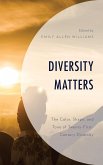Culture Matters in Russia-and Everywhere
Backdrop for the Russia-Ukraine Conflict
Herausgeber: Harrison, Lawrence; Yasin, Evgeny
Culture Matters in Russia-and Everywhere
Backdrop for the Russia-Ukraine Conflict
Herausgeber: Harrison, Lawrence; Yasin, Evgeny
- Broschiertes Buch
- Merkliste
- Auf die Merkliste
- Bewerten Bewerten
- Teilen
- Produkt teilen
- Produkterinnerung
- Produkterinnerung
This study examines modernization, democratization, and economic and political reforms in Russia and elsewhere, and asserts that these reforms can be accomplished through the reframing of cultural values, attitudes, and institutions.
Andere Kunden interessierten sich auch für
![Culture Matters in Russia-and Everywhere Culture Matters in Russia-and Everywhere]() Culture Matters in Russia-and Everywhere189,99 €
Culture Matters in Russia-and Everywhere189,99 €![Where China Meets Southeast Asia Where China Meets Southeast Asia]() Na NaWhere China Meets Southeast Asia38,99 €
Na NaWhere China Meets Southeast Asia38,99 €![Bride in the Cultural Imagination Bride in the Cultural Imagination]() Bride in the Cultural Imagination102,99 €
Bride in the Cultural Imagination102,99 €![Global Migrants, Local Culture Global Migrants, Local Culture]() Laura TabiliGlobal Migrants, Local Culture83,99 €
Laura TabiliGlobal Migrants, Local Culture83,99 €![Theory Matters Theory Matters]() Theory Matters76,99 €
Theory Matters76,99 €![Heritage-Making in Hong Kong Through Culture and Religion Heritage-Making in Hong Kong Through Culture and Religion]() Trevor SofieldHeritage-Making in Hong Kong Through Culture and Religion31,99 €
Trevor SofieldHeritage-Making in Hong Kong Through Culture and Religion31,99 €![Diversity Matters Diversity Matters]() Diversity Matters102,99 €
Diversity Matters102,99 €-
-
-
This study examines modernization, democratization, and economic and political reforms in Russia and elsewhere, and asserts that these reforms can be accomplished through the reframing of cultural values, attitudes, and institutions.
Produktdetails
- Produktdetails
- Verlag: Lexington Books
- Seitenzahl: 582
- Erscheinungstermin: 14. November 2016
- Englisch
- Abmessung: 229mm x 152mm x 31mm
- Gewicht: 831g
- ISBN-13: 9781498503525
- ISBN-10: 1498503527
- Artikelnr.: 46605839
- Herstellerkennzeichnung
- Libri GmbH
- Europaallee 1
- 36244 Bad Hersfeld
- gpsr@libri.de
- Verlag: Lexington Books
- Seitenzahl: 582
- Erscheinungstermin: 14. November 2016
- Englisch
- Abmessung: 229mm x 152mm x 31mm
- Gewicht: 831g
- ISBN-13: 9781498503525
- ISBN-10: 1498503527
- Artikelnr.: 46605839
- Herstellerkennzeichnung
- Libri GmbH
- Europaallee 1
- 36244 Bad Hersfeld
- gpsr@libri.de
Lawrence Harrison is visiting scholar, retired, at Tufts University's Fletcher School and author of Jews, Confucians, and Protestants: Cultural Capital and the End of Multiculturalism. Evgeny Yasin is academic supervisor at the National Research University-Higher School of Economics and author of Will Democracy Survive in Russia?
Part 1: Introduction
Chapter 1: Introduction to the Moscow Symposium Collection, Lawrence
Harrison
Chapter 2:Transformation of Countries in Transition: Culture and the State,
Evgeny Yasin
Part 2: Regional/Civilizational/National Cultures
Chapter 3:European Culture: What It Was, Where It Is Going, Josef Joffe
Chapter 4: Quo Vadis, Latin America? Four Cultural Obstacles to Economic
Development, Oscar Árias Sánchez
Chapter 5: Janus in Latin America, Mariano Grondona
Chapter 6: How Can African Cultural Capital Prosper?, Daniel
Etounga-Manguelle
Chapter 7: Cultural Stability and Long Run Economic Performance, Deepak Lal
Chapter 8: China's Quest for a New Cultural Identity from a Confucian
Humanistic Perspective, Tu Weiming
Chapter 9:Economic and Political Development in Slovenia: Betwixt and
Between Europe and the Balkans, Katherine Taylor
Part Three: Religions and Development
Chapter 10: Contemporary Russian Orthodoxy: From the Social Paradoxes to
theCultural Model, Boris Knorre
Chapter 11: Religious Affiliation and Individual Economic and Political
Attitudes in Ukraine, Maria Snegovaya
Chapter 12: The Cultural Revolution in the Islamic World and What It Means
for the Future of Muslim Societies, Pervez Hoodbhoy
Chapter 13: "Creation Theology" in Economics: Several Catholic Traditions,
Michael Novak
Chapter 14: Fight Ethos versus Work Ethos:The Role of the Catholic Church
in Fostering Pro-Development Values in Poland, Damian Pyrkosz
Chapter 15: Holy Ghost Fire! Pentecostal Religious Culture in Africa,
Rachel Okunubi
Part Four: Culture's Influence on Economic Variables
Chapter 16: The Role of Culture in Understanding theProcess of Economic and
Social Change, Douglass North
Chapter 17: Culture, Cooperation, and Repeated Games, Eric Maskin
Chapter 18: The Effect of Culture on the Functioning of Institutions:
Evidence from European Regions, Mariaflavia Harari and Guido Tabellini
Chapter 19: Culture and Economic Growth: Getting the Theory Right, William
Easterly
Chapter 20: An Appraisal of the Cultural Change Institute Factors Typology,
Matteo Marini
Part Five: Culture, Psychology and Economics
Chapter21: Cultural Values Influence and Constrain Economic and Social
Change, Shalom Schwartz
Chapter 22: Cognition East and West: Fundamental Differences in Reasoning
and Perception, Richard Nisbett
Chapter 23: American Culture and the 2008 Financial Crisis, Geert Hofstede
Chapter 24: Culture of Horizontality and Personal Autonomy: A Humanistic
Approach to Culture Change, Valery Chirkov and Nadezhda Lebedeva
Part Six: Measuring Culture and Cultural Change
Chapter 25: Measuring Culture and Cultural Change: An Introduction, Ronald
Inglehart
Chapter 26: Measuring Cultural Capital and Change: Axiological Diagnosis,
Miguel Basáñez
Chapter 27: Trust and Cultural Change in Argentina: A Latin American
Comparison, Marita Carballo
Part Seven: The Russian Case
Chapter 28: The Economic Wonder: Market and Culture, Oleg Chirkunov
Chapter 29: "All Are Guilty, Which Means That Nobody Is!"--Continuing the
Talk on Progress in Russian Culture, Andrei Konchalovsky
Chapter 30: Basic Human Values of the Russians: Different from and Similar
to Other Europeans, Vladimir Magun and Maksim Rudnev
Chapter 31: Socio-Cultural Modernization in Russia: Norms and Values System
Shift, Natalya Tikhonova
Part Eight: Promoting Progressive Cultural Change
Chapter 32: The Role of the Family in the Acquisition of Values, Jerome
Kagan
Chapter 33: Can Teachers Empower Youth for Democratic Citizenship?
Evaluating Civic Education Pedagogies in Mexican Secondary Schools,
Fernando Reimers, Maria Elena Ortega, Mariali Cardenas, Armando Estrada,
and Emanuel Garza
Chapter 34: The Me to Everyone Cable, Reese Schonfeld with Erica Shusas
Chapter 35: New Occasions Teach New Duties: Social Change and Leadership,
Richard Lamm
Chapter 36: Economic Policy and Cultural Change, James Fox
Chapter 37: Culture and Legal Dogmatism in an Era of Immaterial Wealth: The
Case of Latin America, Octavio Sánchez
Chapter 38: A Culture of Profitability, Robert Kleinbaum
Chapter 1: Introduction to the Moscow Symposium Collection, Lawrence
Harrison
Chapter 2:Transformation of Countries in Transition: Culture and the State,
Evgeny Yasin
Part 2: Regional/Civilizational/National Cultures
Chapter 3:European Culture: What It Was, Where It Is Going, Josef Joffe
Chapter 4: Quo Vadis, Latin America? Four Cultural Obstacles to Economic
Development, Oscar Árias Sánchez
Chapter 5: Janus in Latin America, Mariano Grondona
Chapter 6: How Can African Cultural Capital Prosper?, Daniel
Etounga-Manguelle
Chapter 7: Cultural Stability and Long Run Economic Performance, Deepak Lal
Chapter 8: China's Quest for a New Cultural Identity from a Confucian
Humanistic Perspective, Tu Weiming
Chapter 9:Economic and Political Development in Slovenia: Betwixt and
Between Europe and the Balkans, Katherine Taylor
Part Three: Religions and Development
Chapter 10: Contemporary Russian Orthodoxy: From the Social Paradoxes to
theCultural Model, Boris Knorre
Chapter 11: Religious Affiliation and Individual Economic and Political
Attitudes in Ukraine, Maria Snegovaya
Chapter 12: The Cultural Revolution in the Islamic World and What It Means
for the Future of Muslim Societies, Pervez Hoodbhoy
Chapter 13: "Creation Theology" in Economics: Several Catholic Traditions,
Michael Novak
Chapter 14: Fight Ethos versus Work Ethos:The Role of the Catholic Church
in Fostering Pro-Development Values in Poland, Damian Pyrkosz
Chapter 15: Holy Ghost Fire! Pentecostal Religious Culture in Africa,
Rachel Okunubi
Part Four: Culture's Influence on Economic Variables
Chapter 16: The Role of Culture in Understanding theProcess of Economic and
Social Change, Douglass North
Chapter 17: Culture, Cooperation, and Repeated Games, Eric Maskin
Chapter 18: The Effect of Culture on the Functioning of Institutions:
Evidence from European Regions, Mariaflavia Harari and Guido Tabellini
Chapter 19: Culture and Economic Growth: Getting the Theory Right, William
Easterly
Chapter 20: An Appraisal of the Cultural Change Institute Factors Typology,
Matteo Marini
Part Five: Culture, Psychology and Economics
Chapter21: Cultural Values Influence and Constrain Economic and Social
Change, Shalom Schwartz
Chapter 22: Cognition East and West: Fundamental Differences in Reasoning
and Perception, Richard Nisbett
Chapter 23: American Culture and the 2008 Financial Crisis, Geert Hofstede
Chapter 24: Culture of Horizontality and Personal Autonomy: A Humanistic
Approach to Culture Change, Valery Chirkov and Nadezhda Lebedeva
Part Six: Measuring Culture and Cultural Change
Chapter 25: Measuring Culture and Cultural Change: An Introduction, Ronald
Inglehart
Chapter 26: Measuring Cultural Capital and Change: Axiological Diagnosis,
Miguel Basáñez
Chapter 27: Trust and Cultural Change in Argentina: A Latin American
Comparison, Marita Carballo
Part Seven: The Russian Case
Chapter 28: The Economic Wonder: Market and Culture, Oleg Chirkunov
Chapter 29: "All Are Guilty, Which Means That Nobody Is!"--Continuing the
Talk on Progress in Russian Culture, Andrei Konchalovsky
Chapter 30: Basic Human Values of the Russians: Different from and Similar
to Other Europeans, Vladimir Magun and Maksim Rudnev
Chapter 31: Socio-Cultural Modernization in Russia: Norms and Values System
Shift, Natalya Tikhonova
Part Eight: Promoting Progressive Cultural Change
Chapter 32: The Role of the Family in the Acquisition of Values, Jerome
Kagan
Chapter 33: Can Teachers Empower Youth for Democratic Citizenship?
Evaluating Civic Education Pedagogies in Mexican Secondary Schools,
Fernando Reimers, Maria Elena Ortega, Mariali Cardenas, Armando Estrada,
and Emanuel Garza
Chapter 34: The Me to Everyone Cable, Reese Schonfeld with Erica Shusas
Chapter 35: New Occasions Teach New Duties: Social Change and Leadership,
Richard Lamm
Chapter 36: Economic Policy and Cultural Change, James Fox
Chapter 37: Culture and Legal Dogmatism in an Era of Immaterial Wealth: The
Case of Latin America, Octavio Sánchez
Chapter 38: A Culture of Profitability, Robert Kleinbaum
Part 1: Introduction
Chapter 1: Introduction to the Moscow Symposium Collection, Lawrence
Harrison
Chapter 2:Transformation of Countries in Transition: Culture and the State,
Evgeny Yasin
Part 2: Regional/Civilizational/National Cultures
Chapter 3:European Culture: What It Was, Where It Is Going, Josef Joffe
Chapter 4: Quo Vadis, Latin America? Four Cultural Obstacles to Economic
Development, Oscar Árias Sánchez
Chapter 5: Janus in Latin America, Mariano Grondona
Chapter 6: How Can African Cultural Capital Prosper?, Daniel
Etounga-Manguelle
Chapter 7: Cultural Stability and Long Run Economic Performance, Deepak Lal
Chapter 8: China's Quest for a New Cultural Identity from a Confucian
Humanistic Perspective, Tu Weiming
Chapter 9:Economic and Political Development in Slovenia: Betwixt and
Between Europe and the Balkans, Katherine Taylor
Part Three: Religions and Development
Chapter 10: Contemporary Russian Orthodoxy: From the Social Paradoxes to
theCultural Model, Boris Knorre
Chapter 11: Religious Affiliation and Individual Economic and Political
Attitudes in Ukraine, Maria Snegovaya
Chapter 12: The Cultural Revolution in the Islamic World and What It Means
for the Future of Muslim Societies, Pervez Hoodbhoy
Chapter 13: "Creation Theology" in Economics: Several Catholic Traditions,
Michael Novak
Chapter 14: Fight Ethos versus Work Ethos:The Role of the Catholic Church
in Fostering Pro-Development Values in Poland, Damian Pyrkosz
Chapter 15: Holy Ghost Fire! Pentecostal Religious Culture in Africa,
Rachel Okunubi
Part Four: Culture's Influence on Economic Variables
Chapter 16: The Role of Culture in Understanding theProcess of Economic and
Social Change, Douglass North
Chapter 17: Culture, Cooperation, and Repeated Games, Eric Maskin
Chapter 18: The Effect of Culture on the Functioning of Institutions:
Evidence from European Regions, Mariaflavia Harari and Guido Tabellini
Chapter 19: Culture and Economic Growth: Getting the Theory Right, William
Easterly
Chapter 20: An Appraisal of the Cultural Change Institute Factors Typology,
Matteo Marini
Part Five: Culture, Psychology and Economics
Chapter21: Cultural Values Influence and Constrain Economic and Social
Change, Shalom Schwartz
Chapter 22: Cognition East and West: Fundamental Differences in Reasoning
and Perception, Richard Nisbett
Chapter 23: American Culture and the 2008 Financial Crisis, Geert Hofstede
Chapter 24: Culture of Horizontality and Personal Autonomy: A Humanistic
Approach to Culture Change, Valery Chirkov and Nadezhda Lebedeva
Part Six: Measuring Culture and Cultural Change
Chapter 25: Measuring Culture and Cultural Change: An Introduction, Ronald
Inglehart
Chapter 26: Measuring Cultural Capital and Change: Axiological Diagnosis,
Miguel Basáñez
Chapter 27: Trust and Cultural Change in Argentina: A Latin American
Comparison, Marita Carballo
Part Seven: The Russian Case
Chapter 28: The Economic Wonder: Market and Culture, Oleg Chirkunov
Chapter 29: "All Are Guilty, Which Means That Nobody Is!"--Continuing the
Talk on Progress in Russian Culture, Andrei Konchalovsky
Chapter 30: Basic Human Values of the Russians: Different from and Similar
to Other Europeans, Vladimir Magun and Maksim Rudnev
Chapter 31: Socio-Cultural Modernization in Russia: Norms and Values System
Shift, Natalya Tikhonova
Part Eight: Promoting Progressive Cultural Change
Chapter 32: The Role of the Family in the Acquisition of Values, Jerome
Kagan
Chapter 33: Can Teachers Empower Youth for Democratic Citizenship?
Evaluating Civic Education Pedagogies in Mexican Secondary Schools,
Fernando Reimers, Maria Elena Ortega, Mariali Cardenas, Armando Estrada,
and Emanuel Garza
Chapter 34: The Me to Everyone Cable, Reese Schonfeld with Erica Shusas
Chapter 35: New Occasions Teach New Duties: Social Change and Leadership,
Richard Lamm
Chapter 36: Economic Policy and Cultural Change, James Fox
Chapter 37: Culture and Legal Dogmatism in an Era of Immaterial Wealth: The
Case of Latin America, Octavio Sánchez
Chapter 38: A Culture of Profitability, Robert Kleinbaum
Chapter 1: Introduction to the Moscow Symposium Collection, Lawrence
Harrison
Chapter 2:Transformation of Countries in Transition: Culture and the State,
Evgeny Yasin
Part 2: Regional/Civilizational/National Cultures
Chapter 3:European Culture: What It Was, Where It Is Going, Josef Joffe
Chapter 4: Quo Vadis, Latin America? Four Cultural Obstacles to Economic
Development, Oscar Árias Sánchez
Chapter 5: Janus in Latin America, Mariano Grondona
Chapter 6: How Can African Cultural Capital Prosper?, Daniel
Etounga-Manguelle
Chapter 7: Cultural Stability and Long Run Economic Performance, Deepak Lal
Chapter 8: China's Quest for a New Cultural Identity from a Confucian
Humanistic Perspective, Tu Weiming
Chapter 9:Economic and Political Development in Slovenia: Betwixt and
Between Europe and the Balkans, Katherine Taylor
Part Three: Religions and Development
Chapter 10: Contemporary Russian Orthodoxy: From the Social Paradoxes to
theCultural Model, Boris Knorre
Chapter 11: Religious Affiliation and Individual Economic and Political
Attitudes in Ukraine, Maria Snegovaya
Chapter 12: The Cultural Revolution in the Islamic World and What It Means
for the Future of Muslim Societies, Pervez Hoodbhoy
Chapter 13: "Creation Theology" in Economics: Several Catholic Traditions,
Michael Novak
Chapter 14: Fight Ethos versus Work Ethos:The Role of the Catholic Church
in Fostering Pro-Development Values in Poland, Damian Pyrkosz
Chapter 15: Holy Ghost Fire! Pentecostal Religious Culture in Africa,
Rachel Okunubi
Part Four: Culture's Influence on Economic Variables
Chapter 16: The Role of Culture in Understanding theProcess of Economic and
Social Change, Douglass North
Chapter 17: Culture, Cooperation, and Repeated Games, Eric Maskin
Chapter 18: The Effect of Culture on the Functioning of Institutions:
Evidence from European Regions, Mariaflavia Harari and Guido Tabellini
Chapter 19: Culture and Economic Growth: Getting the Theory Right, William
Easterly
Chapter 20: An Appraisal of the Cultural Change Institute Factors Typology,
Matteo Marini
Part Five: Culture, Psychology and Economics
Chapter21: Cultural Values Influence and Constrain Economic and Social
Change, Shalom Schwartz
Chapter 22: Cognition East and West: Fundamental Differences in Reasoning
and Perception, Richard Nisbett
Chapter 23: American Culture and the 2008 Financial Crisis, Geert Hofstede
Chapter 24: Culture of Horizontality and Personal Autonomy: A Humanistic
Approach to Culture Change, Valery Chirkov and Nadezhda Lebedeva
Part Six: Measuring Culture and Cultural Change
Chapter 25: Measuring Culture and Cultural Change: An Introduction, Ronald
Inglehart
Chapter 26: Measuring Cultural Capital and Change: Axiological Diagnosis,
Miguel Basáñez
Chapter 27: Trust and Cultural Change in Argentina: A Latin American
Comparison, Marita Carballo
Part Seven: The Russian Case
Chapter 28: The Economic Wonder: Market and Culture, Oleg Chirkunov
Chapter 29: "All Are Guilty, Which Means That Nobody Is!"--Continuing the
Talk on Progress in Russian Culture, Andrei Konchalovsky
Chapter 30: Basic Human Values of the Russians: Different from and Similar
to Other Europeans, Vladimir Magun and Maksim Rudnev
Chapter 31: Socio-Cultural Modernization in Russia: Norms and Values System
Shift, Natalya Tikhonova
Part Eight: Promoting Progressive Cultural Change
Chapter 32: The Role of the Family in the Acquisition of Values, Jerome
Kagan
Chapter 33: Can Teachers Empower Youth for Democratic Citizenship?
Evaluating Civic Education Pedagogies in Mexican Secondary Schools,
Fernando Reimers, Maria Elena Ortega, Mariali Cardenas, Armando Estrada,
and Emanuel Garza
Chapter 34: The Me to Everyone Cable, Reese Schonfeld with Erica Shusas
Chapter 35: New Occasions Teach New Duties: Social Change and Leadership,
Richard Lamm
Chapter 36: Economic Policy and Cultural Change, James Fox
Chapter 37: Culture and Legal Dogmatism in an Era of Immaterial Wealth: The
Case of Latin America, Octavio Sánchez
Chapter 38: A Culture of Profitability, Robert Kleinbaum









